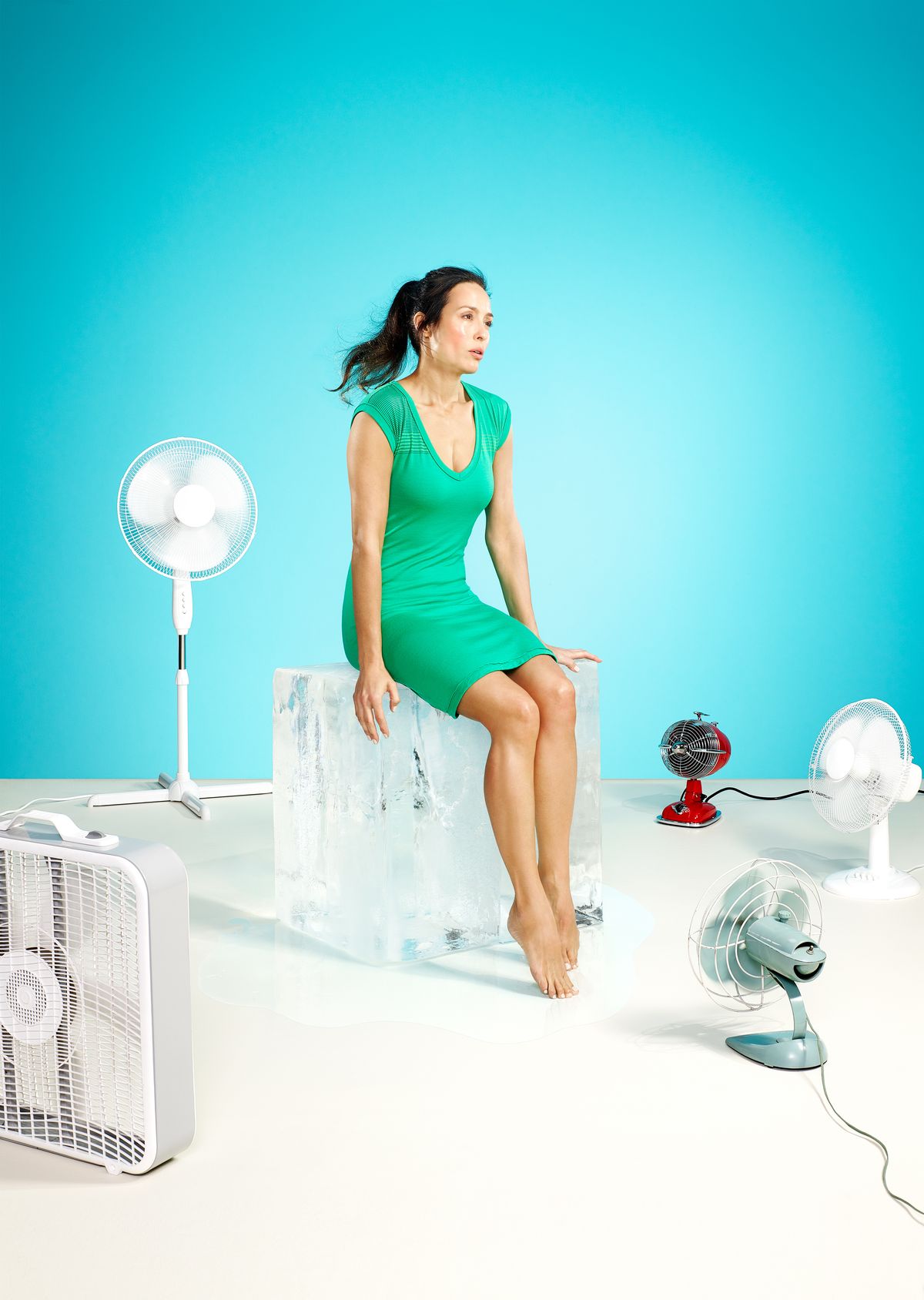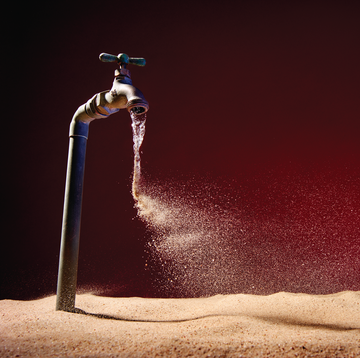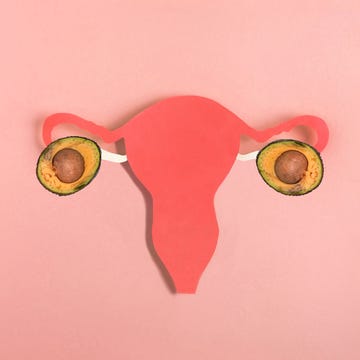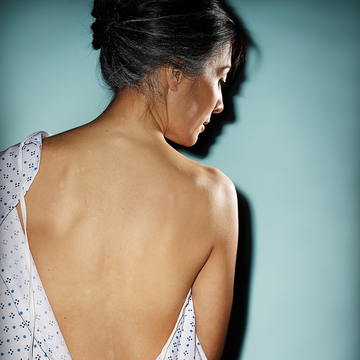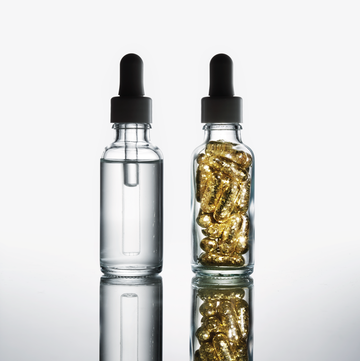We’ve come a long-ish way in normalizing what happens to women as they approach menopause. From the rise in popularity of #MenopauseTok (a hashtag with nearly 10 million uses on TikTok) to beauty brands creating products that specifically address this time of life, there’s a huge effort being made to destigmatize “the change.” And yet, even still, there are a ton of symptoms people simply never talk about.
Perimenopause symptoms are a moving target, says Suzanne Gilberg-Lenz, MD, author of the newly released Menopause Bootcamp. She’s describing the biological mayhem that can ensue before bona fide menopause (defined by 12 consecutive months without menstruating) sets in. Perimenopause can span anywhere from one to over 20 years, and while some of the common symptoms are, thankfully, being recognized (hello, hot flashes!), others are under-diagnosed and under-talked about. The result: Women are left baffled, annoyed, embarrassed, or even scared. Oprah herself recently revealed she dealt with heart palpitations—and was terrified something was seriously wrong before finding out they were menopause-related.
This lack of transparency around symptoms is something Gilberg-Lenz finds unacceptable, and one that’s compelling experts like her to do their part to disassemble the hush-hush nature that continues to cloud women’s midlife. “I want women to come into this prepared, demanding information and speaking about it loudly,” says Gilberg-Lenz. We’re on board. Herewith, we highlight five of the most surprising symptoms and how best to handle them.
You flood. Through everything. Even though your period is supposed to be dying down.
Flooding is exactly what it sounds like. Seemingly out of nowhere, you gush enough blood to take out everything in its wake—super-plus tampons, your pretty pants, all of it. “We call it crime scene bleeding,” jokes Gilberg-Lenz. Your hormones are seesawing, causing your cycle to veer as well, she explains. “When you don’t have a regular, predictable cycle, and you go longer between periods, you can accumulate a lot more of the lining in your uterus, the endometrium, than usual. Eventually, it’s going to come out. And it can come out all at once—very, very heavy.” Knowing this, if it’s been a while since your last period, you should be prepared for anything. “Period panties can be really helpful. At least there’s a layer between you and the world,” says Gilberg-Lenz, who cautions that heavy bleeding can also be caused by fibroids, polyps, and even cancer, so you definitely want to have those ruled out by your doctor if you are experiencing flooding. If fluctuating hormones are indeed the culprit, and the flooding is not a one-time deal, your doctor may start the conversation about hormone replacement therapy as a solution or suggest an IUD with progestin.
You break out like you’re back in puberty.
Dry skin—totally expected. Wrinkles? Not ideal, but sure, we’re human. Acne, though? Really? Unfortunately, midlife breakouts are very real, and very frustrating. A couple of things are happening. For one, again, those yo-yoing hormone levels are causing a preponderance of testosterone compared to estrogen (which is diminishing at a faster rate), and that can trigger breakouts, explains Dendy Engelman, MD, a board-certified dermatologist in New York City. “Estrogen also assists with keeping cortisol levels in check,” she says, “so when estrogen decreases, there’s more cortisol to prompt the sebaceous glands to produce excess oil and provoke acne. This is why managing stress to ease up on cortisol is so important for reducing the chances of triggering flare-ups.” Engelman is also adamant about wearing sunscreen daily to prevent the acne-irritating inflammation UV exposure causes. For a more targeted solution, she’ll prescribe spironolactone, which blocks the androgenic hormonal effects leading to breakouts. And now, as an alternative to meds, there’s a new savior in the form of a noninvasive laser called AviClear, which uses light to suppress the sebaceous glands and prevent excessive oil production to treat mild, moderate, or severe acne. You may also want to add a weekly pro-level exfoliation peel, such as Glo Skin Beauty’s Beta-Clarity AHA Clarifying Peel, to remove excess oil that can clog pores and cause pimples.
Raising your arm is agonizing, and your knuckles are now huge.
Pretty much every cell in our body has an estrogen receptor—meaning the hormone impacts everything from your brain to your reproductive tract to your joints, according to Gilberg-Lenz. “Estrogen has an anti-inflammatory effect, so as levels decline, we experience more inflammation, less lubrication, and changes to the joint structure. This causes tenderness and swelling, and specifically stiffness and pain in the shoulder joint, referred to as frozen shoulder.” Wherever you’re feeling it—shoulder, fingers, hips—movement is key. Gilberg-Lenz says that getting blood flowing in the area is critical to bring needed oxygen and nutrients. This means exercising, stretching, and possibly physical therapy. Another smart habit is eating an anti-inflammatory diet full of fruit and vegetables, staying hydrated, and getting your omega-3 fatty acids (from fish like salmon and sardines), which is proven to help alleviate swelling.
You smell like a totally different person. And it’s not always great.
This is a factor of your bacteria-sweat relationship. The bacteria that live on your body (remember, you have a microbiome everywhere—skin, vagina, gut) feast on compounds in your sweat, after which they emit pungent by-products. Enter perimenopause, when levels of estrogen, progesterone, and testosterone fluctuate, causing a ripple effect on your microbiome. “Hormones and pH balance shifts, bacteria species and counts shift, and thus, odor shifts,” says Gilberg-Lenz. At the same time, you’re likely sweating more, due to hot flashes and night sweats, building a friendly, nourishing environment for your new bacteria community. And if you’re dehydrated (due to a higher body temperature when having flashes), things get worse: Your sweat becomes concentrated, which may produce more potent smells when consumed by the bugs.
You may be tempted to take an extra shower or two each day, but that would be a mistake. “Don’t over-cleanse!” warns Gilberg-Lenz. “You don’t want to use harsh ingredients that get rid of your healthy bacteria. Wash normally.” Wear breathable fabrics like cotton, hemp, and linen, so you’re not trapping sweat, and drink water. Also, Gilberg-Lenz emphasizes that you shouldn’t panic if you’re not loving your new smell—your odor will likely keep shifting along with your hormones.
You’re feeling fine…then sudden dread takes you down.
Not-so-fun fact: Perimenopause can trigger a sense of crushing worry, shortness of breath, sudden heart palpitations, and even a feeling of dread. “When not ovulating, or ovulating later in the month, you’re making much less progesterone in the second half of your cycle than usual,” explains Gilberg-Lenz. “That dip can cause anxiety to rise. I’ve witnessed many women having really intense reactions during this time—panic attacks that come out of nowhere, an out-of-body sensation, a feeling that they’re not themselves.”
Healthy lifestyle habits can go a long way to help ease symptoms. Exercise is a proven method for increasing the amount of anxiety-reducing chemicals in your brain. Other usual suspects like meditation, yoga, and controlled-breathing practices may seem simple but can be extremely effective, according to a vast amount of research. Gilberg-Lenz also recommends an herb called Vitex that can take the edge off (just be sure to find a reputable source), and studies show that consuming magnesium and zinc, in foods like eggs, oysters, and legumes, has an impressive impact. “You may want to talk to your doctor about replacing progesterone during the second half of your cycle, which can be very helpful for some women,” advises Gilberg-Lenz. And while it’s a big decision, she says, antidepressants can also be a sanity savor for many. The good news, she points out: When hormones become steady eventually, most women feel a million times better.
